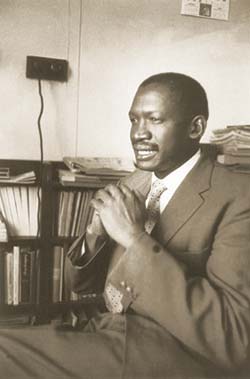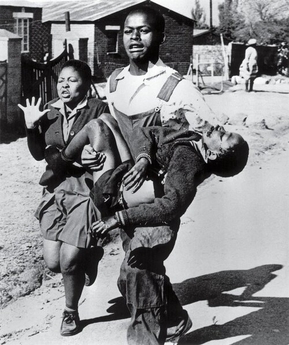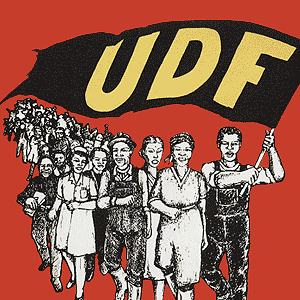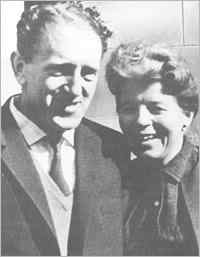Related Research Articles

Robert Mangaliso Sobukwe was a South African anti-apartheid revolutionary and founding member of the Pan Africanist Congress (PAC), serving as the first president of the organization.

The Defiance Campaign against Unjust Laws was presented by the African National Congress (ANC) at a conference held in Bloemfontein, South Africa in December 1951. The Campaign had roots in events leading up the conference. The demonstrations, taking place in 1952, were the first "large-scale, multi-racial political mobilization against apartheid laws under a common leadership."
The Anti-Apartheid Movement (AAM) was a British organisation that was at the centre of the international movement opposing the South African apartheid system and supporting South Africa's non-White population who were persecuted by the policies of apartheid. The AAM changed its name to ACTSA: Action for Southern Africa in 1994, when South Africa achieved majority rule through free and fair elections, in which all races could vote.

The University of Limpopo is a public university in the Limpopo Province, South Africa. It was formed on 1 January 2005, by the merger of the University of the North and the Medical University of South Africa (MEDUNSA). These previous institutions formed the Turfloop and MEDUNSA campuses of the university, respectively. In 2015 the MEDUNSA campus split and became the Sefako Makgatho Health Sciences University.

East Caprivi or Itenge was a bantustan and later a non-geographic ethnic-based second-tier authority, the Representative Authority of the Caprivis in South West Africa, intended by the apartheid government to be a self-governing homeland for the Masubiya people.
The Azanian People's Liberation Army (APLA), formerly known as Poqo, was the military wing of the Pan Africanist Congress, an African nationalist movement in South Africa. In the Xhosa language, the word 'Poqo' means 'pure'.

Apartheid was a system of institutionalised racial segregation that existed in South Africa and South West Africa from 1948 to the early 1990s. Apartheid was characterised by an authoritarian political culture based on baasskap, which ensured that South Africa was dominated politically, socially, and economically through minoritarianism by the nation's dominant minority white population. According to this system of social stratification, white citizens had the highest status, followed by Indians and Coloureds, then Black Africans. The economic legacy and social effects of apartheid continue to the present day, particularly inequality.
The Black Consciousness Movement (BCM) was a grassroots anti-Apartheid activist movement that emerged in South Africa in the mid-1960s out of the political vacuum created by the jailing and banning of the African National Congress and Pan Africanist Congress leadership after the Sharpeville Massacre in 1960. The BCM represented a social movement for political consciousness.
[Black Consciousness'] origins were deeply rooted in Christianity. In 1966, the Anglican Church under the incumbent, Archbishop Robert Selby Taylor, convened a meeting which later on led to the foundation of the University Christian Movement (UCM). This was to become the vehicle for Black Consciousness.

The Soweto uprising was a series of demonstrations and protests led by black school children in South Africa during apartheid that began on the morning of 16 June 1976.

The United Democratic Front (UDF) was a South African popular front that existed from 1983 to 1991. The UDF comprised more than 400 public organizations including trade unions, students' unions, women's and parachurch organizations. The UDF's goal was to establish a "non-racial, united South Africa in which segregation is abolished and in which society is freed from institutional and systematic racism." Its slogan was "UDF Unites, Apartheid Divides." The Front was established in 1983 to oppose the introduction of the Tricameral Parliament by the white-dominated National Party government, and dissolved in 1991 during the early stages of the transition to democracy.
The South African Students' Organisation (SASO) was a body of black South African university students who resisted apartheid through non-violent political action. The organisation was formed in 1969 under the leadership of Steve Biko and Barney Pityana and made vital contributions to the ideology and political leadership of the Black Consciousness Movement. It was banned by the South African government in October 1977, as part of the repressive state response to the Soweto uprising.

Lionel "Rusty" Bernstein was a Jewish South African anti-apartheid activist and political prisoner. He played a key role in political organizations such as the South African Communist Party (SACP) and the African National Congress (ANC). He helped form the South African Congress of Democrats to bolster white participation in the ANC, and he brought its allies together to establish a Congress of the People, working closely with Nelson Mandela.
Radio Freedom also called Radio Zambia was a South African radio arm of the African National Congress (ANC) and its fighting wing Umkhonto we Sizwe (MK) during the anti-Apartheid struggle from the 1970s through the 1990s. It was the oldest liberation radio station in Africa. Listening to Radio Freedom in Apartheid-era South Africa was a crime carrying a penalty of up to eight years in prison.
Kogila Moodley is a published academic and sociologist at the University of British Columbia, where she was the first holder of the David Lam Chair of Multicultural Studies. She serves on the board of directors of the International Sociological Association's Race Relations Committee, and was its President from (1998–2002).

Internal resistance to apartheid in South Africa originated from several independent sectors of South African society and took forms ranging from social movements and passive resistance to guerrilla warfare. Mass action against the ruling National Party (NP) government, coupled with South Africa's growing international isolation and economic sanctions, were instrumental in leading to negotiations to end apartheid, which began formally in 1990 and ended with South Africa's first multiracial elections under a universal franchise in 1994.

Egyptian-South African relations is the relationship between the governments of the Arab Republic of Egypt and Republic of South Africa. The first South African mission in Egypt was established in 1942 as a Consulate-General. Egypt maintained diplomatic relations with South Africa until 1961.
The Lesbian and Gay Equality Project (LGEP), formerly known as the National Coalition for Gay and Lesbian Equality (NCGLE), is a non-profit, non-governmental organization in South Africa that focuses on the expansion of LGBT civil rights in South Africa and other countries in sub-Saharan Africa. It was co-founded by Zackie Achmat in 1994, and successfully lobbied for the inclusion of sexual orientation as a basis for non-discrimination laws in the country after the end of the apartheid period. The organization has continued to operate after South Africa officially legalized same-sex marriage in 2005. Its work includes "law reform, lobbying, litigation, advocacy, employment equity, leadership training and development."
The South African Youth Revolutionary Council (SAYRCO) was a South African political organisation. SAYRCO profiled itself as a 'third force' in the anti-Apartheid struggle. It was associated with the Black Consciousness Movement.

The Prohibition of Political Interference Act, 1968, was a piece of apartheid legislation in South Africa that sought to prevent racial groups from collaborating with each other for a political purpose. This act is thought to have been enacted by the ruling apartheid government to prevent the strong growth of the Liberal Party of South Africa (LPSA), which were made up of South Africans of various races who were against the racially divisive policies of the Apartheid regime government.

South Africa–Sweden relations refers to the bilateral relations between Sweden and South Africa.
References
This article includes a list of references, related reading, or external links, but its sources remain unclear because it lacks inline citations .(December 2016) |